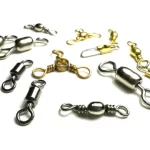Nothing can interrupt a good fishing day quite like a stubbornly stuck hook. While it’s a common frustration for anglers, learning to effectively retrieve a hook with a spin rod is essential for preventing lost tackle and staying in the rhythm of fishing. Here are strategies to help anglers free a stuck hook and get back to reeling in catches smoothly.
Why Hooks Get Stuck
Fishing in areas with submerged rocks, logs, or weeds significantly increases the risk of a stuck hook. The most effective techniques depend on how and where the hook is snagged, but using the right strategies can often prevent losing valuable lures.
Step-by-Step Guide for Dislodging a Hook
1. Assess the Snag’s Cause and Location
Understanding where the hook is snagged helps determine the best retrieval technique. If a hook is caught on underwater vegetation, for instance, it may only require a light pull and wiggle, whereas a rock snag may need a different approach.
2. The Reel and Release Method
To use this technique:
- Start by reeling in any slack line to gain direct contact with the hook.
- Lower the rod tip directly above the snag and give a firm, sharp tug.
- Quickly release tension to see if the hook loosens. This back-and-forth can sometimes help it slide off an obstruction without breaking the line.
3. Try the Bow-and-Snap Technique
Especially helpful for rocky snags, this involves:
- Pointing the rod directly at the snag with the line taut.
- Pulling the rod back like drawing a bow, and then letting the line snap back. The sudden tension change can often free the hook.
4. Change Your Angle
Changing the angle of pull can often dislodge a hook by shifting its position in the snag. If possible, reel in some line and move a few feet to one side, pulling from the new angle. This change can sometimes pop the hook free by working it out of crevices.
5. Underwater Tugging with a Split Shot
Adding a split shot a few feet above the hook increases weight and helps the line sink closer to the snag, providing a direct downward pull. Slowly reel in to add tension, making small tugs until the hook loosens.

Preventing Stuck Hooks in the Future
- Adjust Fishing Depth: Keeping lures or baits slightly above structures can help reduce the risk of snags.
- Use Weedless Hooks: Specially designed weedless hooks are ideal for fishing in areas dense with vegetation and can lower the chance of snags.
- Opt for Braided Line: Braided lines are more resistant to breakage when pulling out a stuck hook, giving an added advantage.
When All Else Fails
If none of the techniques work, it may be best to cut the line and accept the loss. Using quick-release clips or practicing knot efficiency allows for fast re-rigging, which is especially handy when fishing with valuable lures.
With these strategies, anglers can minimize the downtime caused by a stuck hook and continue enjoying the thrill of the catch.
Image: aprilvokey





